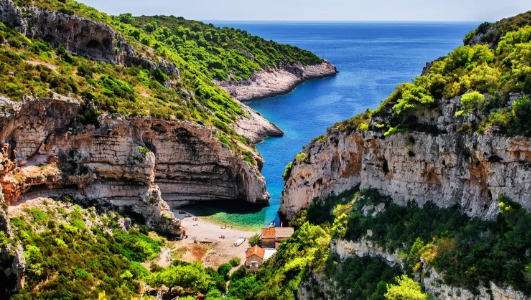A Realistic Framework
Croatia Prepares For The Summer Season

With the destination continuing to open up for travel from many European countries yet not for all international markets, Ina Rodin, Director North America for Croatia National Tourist Office, says its promotional efforts are twofold.
Currently, the campaign “The Vacation You Deserve is Closer Than You Think” is being run across markets such as Slovenia, Austria, Germany, Hungary, Slovakia and Poland, which have easy access to the destination, while a user-generated content campaign is being run across social media for long-haul destinations under the slogan “Enjoy the View from Croatia.”
Although Croatia has recorded a significant decrease in tourist traffic, namely a cumulative decline of about 70%, which will have a negative impact on the revenue side, she says they are already seeing interest in 2021 from many travellers who may not be ready or able to visit this year, which they find encouraging.

Ina Rodin, Director North America, Croatia National Tourist Office
“Companies in the tourist sector are still coping well with the crisis, working together with the support of the government, they have adopted packages of measures and assistance provided to offset the negative economic impact during this downturn,” Rodin tells Travel Courier. “This has aided in preserving jobs and the liquidity of the companies, which was the strategic goal of the measures. We are approaching the high season of summer, during which, due to the excellent epidemiological situation in our country, we expect to generate some tourist traffic and resume some tourism within a realistic framework.”
With the European Union’s announcement that it will reopen its borders to travellers from 14 countries, including Canada, she’s optimistic about the future.
“Prior to the pandemic, for the past several years, Croatia has recorded a continuous increase in arrivals and overnight stays of both domestic and foreign tourists,” she points out. “In 2019, based on data from our visitor registration system, eVisitor, 109 million overnight stays were recorded, which is 2.5 percent more than in 2018. Positive trends in tourism in Croatia were also confirmed by financial indicators. Total revenues in tourism from foreign guests in 2019 exceeded 10 billion euros, and tourism generates about 20% of GDP, while it is estimated that tourism employs more than 150,000 people in Croatia. Given these numbers and the importance of tourism for the country, great effort will also be placed on regaining guests over the longer term and keeping Croatia top of mind for 2021.”
As for challenges, she predicts the reintroduction of flights and regaining numbers to pre-pandemic levels will be a much longer process.
“In the near-term we will see the industry adapt to the need and emphasis on health, safety and security measures, while tourism services and products will adapt to reflect this,” she says. “Airlines have seen major disruption and this will surely have a ripple effect across the entire industry, while we as a tourist board have seen a definite increase in the need for accurate information dissemination and a greater need for formal/official information to be available to potential visitors.”
She says the CNTB has held and will continue to hold webinars across key markets to engage with the travel trade. Overall, she says the tourist board is confident that the tourism market will adapt, albeit that the speed of recovery to pre-pandemic volumes is difficult to accurately foresee.
“The crisis has shown the importance of tourism for many economies, namely its deep connection and impact on other segments of the economy. It is certain that tourism, especially in this first period after the corona crisis, will differ in the way the processes will be executed, because the emphasis will be on health, safety and security measures that will enable us to bring this pandemic to a halt. However, we understand that people can hardly wait to travel and this is something we all must have in mind when building the future of tourism together, while taking even more care of environmental and sustainable development,” she says. “This has also provided opportunities to develop new and innovative services and tourism products, from promotion of more individual and small group activities, to digital products including contactless check-in and similar digital alternatives for guest services.”
Photo of Stiniva Beach on the island of Vis by Aleksandar Gospic
Tags:


